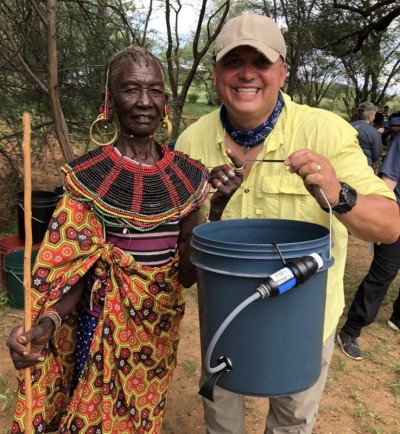World Water Day: One of Africa's biggest slums will have clean water by end of 2024

I had no idea how big the global water crisis was until my eyes were opened in 2012. I was accompanying my daughter on a mission trip to the Brazilian Amazon. As we pulled up to one home, a woman greeted me by offering a glass of water. I watched her walk over to the Amazon River, dip a glass into the river, and proceed to hand it to me.
I knew I could not drink the water but more importantly, I was heartbroken that this was the unclean, disease-ridden water this woman drank every single day. I knew I had to do something.
For most of us sitting in comfortable homes with seemingly unlimited clean water freely coming out of our faucets, it is difficult to understand what the world water crisis actually means to those experiencing it.
Approximately 2 billion people in the world lack access to clean, safe drinking water, according to the United Nations. Drinking and washing with contaminated water are linked to the transmission of diseases such as cholera, diarrhea, dysentery, hepatitis A, typhoid, and polio. One of the leading causes of death each year, especially for children under the age of five, is diarrheal disease, which some 829,000 people are estimated to die from each year.
Yet, this is all preventable with access to clean water.
March 22 is World Water Day, a time to highlight solutions for the 2 billion still without clean water.
I often think of that dirty water the woman in Brazil handed me. It was brown and cloudy. It would have certainly made me sick if I had drunk it. It likely would not have fully quenched my thirst and even if it did, it certainly would not have tasted good. That glass of water perfectly represents my life without Jesus and is why I now do what I do.
Our nonprofit, The Bucket Ministry, is at the forefront of giving communities most in need access to clean water and Jesus. We certainly believe both are vital to healthy lives, families, and communities. The work is accomplished through a simple water filter connected to a bucket and the act of building relationships.
We have seen the power of this work unfold in more ways than one. Located in Nairobi, Kenya is Kibera, one of the largest slums in Africa where 408,478 people live with no running water, no permanent electricity, no social services, and only 78 public latrines. We have trained Kibera residents to distribute water filters to the slum’s residents. Because of their work, 61% of Kibera’s homes now have access to clean water, and we anticipate the entire slum will be served by the end of 2024.
This life-saving access to water coupled with a message of Jesus is impacting this community. Kibera’s governmental elders testify that the efforts are not only resulting in the consolidation of health clinics and healthier family members but also nicer and happier residents.
We believe this model of neighbor-serving-neighbor is the key to solving the world water crisis. More importantly, it has the power to transform communities worldwide, including those in our great nation. While most of America is not struggling with access to clean water, we can all benefit from the help of our neighbors and the love of Jesus, and I hope that is something we never forget.
Christopher Beth is the founder, chief storyteller and director of The Bucket Ministry, a global nonprofit sharing God’s love through the gift of clean, safe, drinking water.





















